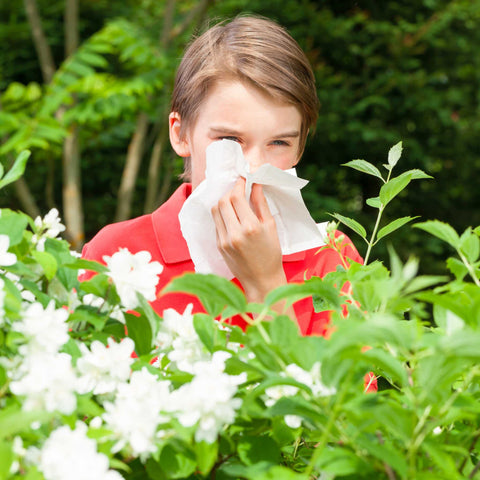
Spring Allergies and Kids' Nutrition
Contents
Last 10 Articles
- This Is Why Unstructured Playtime Is Vital for Your Child’s Development
- Dog Food Hacks for Picky Eaters: Healthy Tips to Ensure They Love Mealtime
- When to Seek Medical Attention: Recognizing the Signs in Sick Kids*
- Kid-Friendly Veggie Smoothies: Delicious Recipes Even Picky Eaters Can’t Resist
- Sleeping Through the Night: Expert Tips That Will Make Parents and Kids Happier
- How Veggie Powders Fill Nutritional Gaps: The Essential Guide for Parents
- Navigating the New Challenges of Parenting Elderly Parents with Compassion
- Quick & Healthy Breakfast Ideas That Will Make Your Mornings Easier
- Why You Should Adopt These Tantrum Taming Techniques
- Turning Spring Cleaning into a Game: Engaging Kids in Household Chores
Spring allergies, also known as allergic rhinitis or hay fever, occur when the immune system overreacts to allergens in the environment. Common symptoms include sneezing, runny nose, itchy eyes, and congestion, which can make children feel uncomfortable and irritable.
During allergy season, it's crucial to support children's immune systems with nutrient-rich foods, including vitamins C, D, zinc, and omega-3 fatty acids, to strengthen defenses against allergens.
Minimizing exposure to common allergy triggers is key to managing children's allergies during the spring season. Parents can take proactive steps to reduce allergens in the home by regularly cleaning and vacuuming, using air purifiers, and keeping windows closed on high pollen days. When spending time outdoors, children can wear sunglasses and hats to protect their eyes and face from pollen exposure.
Understanding Spring Allergies in Children
Definition and Common Triggers
Spring allergies are allergic reactions triggered by allergens such as pollen from trees, grasses, and flowers. When children with allergies come into contact with these allergens, their immune system reacts by releasing histamines, causing symptoms like sneezing, runny nose, itchy eyes, and congestion.
Symptoms and Challenges
Children with spring allergies often experience uncomfortable symptoms that can affect their daily activities and quality of life. These symptoms may include persistent sneezing, nasal congestion, watery eyes, and itching in the nose, eyes, or throat.
Allergy symptoms can disrupt children's sleep, concentration, and overall well-being, making it challenging for them to participate in school, sports, and other activities.
Importance of Proactive Management
Proactive management and prevention are crucial for minimizing the impact of spring allergies on children's health and quality of life.
By taking steps to identify and address allergy triggers, parents can help their children avoid exposure to allergens and reduce the severity of allergy symptoms. Additionally, early intervention and treatment can help alleviate discomfort and prevent complications associated with untreated allergies.
Nutrients and Foods to Support Immune Health

Highlighting Key Nutrients
Several nutrients play essential roles in supporting children's immune systems and may help alleviate allergy symptoms. These include vitamin C, vitamin D, zinc, omega-3 fatty acids, and antioxidants like quercetin and flavonoids. Ensuring children consume adequate amounts of these nutrients through their diet can strengthen their immune response and reduce the severity of allergy symptoms.
Importance of a Balanced Diet
A balanced diet that includes a variety of nutrient-dense foods is crucial for supporting children's immune health. Fruits, vegetables, whole grains, lean proteins, and healthy fats provide essential vitamins, minerals, and antioxidants that help regulate the immune system and protect against infections and allergies.
Encouraging children to eat a diverse range of foods ensures they receive the nutrients they need to stay healthy and resilient during allergy season.
Foods to Support Immunity
Certain foods are particularly beneficial for boosting immunity and reducing allergy symptoms in children. Examples include citrus fruits, berries, leafy greens, bell peppers, nuts, seeds, fatty fish, yogurt, and fortified dairy products.
These foods are rich in vitamins, minerals, and other nutrients that support immune function and may help alleviate inflammation and allergic reactions. Incorporating these foods into children's diets can contribute to overall immune health and resilience against seasonal allergies.
Incorporating Allergy-Friendly Foods into Kids' Diet
Tips for Inclusion
Despite dietary restrictions, providing nutritious meals to children with allergies is crucial. Opt for whole foods free from allergens, read food labels, and choose certified allergen-free products to ensure their health and well-being.
Creative Recipes and Snack Ideas
There are countless creative and delicious recipes that utilize allergy-friendly ingredients to appeal to children's taste buds. For example, swap dairy milk with plant-based alternatives like almond milk or oat milk in smoothies, oatmeal, or baked goods.
Make homemade trail mix using allergen-free nuts, seeds, and dried fruits for a nutritious and satisfying snack. Additionally, experiment with allergy-friendly flours like almond flour or coconut flour to create pancakes, muffins, and cookies that are safe for children with gluten allergies.
Strategies for Accommodation
Meal preparation for children with specific allergies necessitates careful planning and consideration. Open communication with parents, offering alternative ingredients, and educating children about their allergies promotes independence and self-care.
Hydration and Allergy Management

Importance of Staying Hydrated
Proper hydration is crucial for managing allergy symptoms, as it helps thin mucus secretions and soothes irritated airways, making it easier for children to breathe. Dehydration can exacerbate allergy symptoms, leading to increased congestion and discomfort.
Therefore, ensuring that children stay adequately hydrated during allergy season is essential for their overall well-being and symptom relief.
Hydrating Foods and Beverages
Incorporating hydrating foods and beverages into kids' diets can help maintain optimal hydration levels throughout the day. Encourage children to consume plenty of water, herbal teas, and diluted fruit juices to quench their thirst and replenish lost fluids.
Additionally, include hydrating fruits and vegetables in meals and snacks, such as watermelon, cucumbers, oranges, and strawberries, which have high water content and provide essential vitamins and minerals to support immune function.
Tips for Encouraging Hydration
Encouraging children to drink enough fluids can sometimes be challenging, especially if they prefer sugary or carbonated beverages. To promote hydration, offer water with meals and throughout the day, and make it easily accessible by keeping reusable water bottles handy.
Get creative with flavored water by adding slices of citrus fruits, berries, or fresh herbs for a refreshing twist. Additionally, involve children in choosing their beverages and allow them to experiment with different options to find what they enjoy most.
By making hydration fun and engaging, children are more likely to stay hydrated and manage their allergy symptoms effectively.
Avoiding Common Allergy Triggers

Identifying Common Allergy Triggers for Children
Children often experience allergic reactions due to common outdoor triggers such as pollen, mold spores, and dust mites. Understanding these triggers can help create a healthier environment for them, preventing worsening symptoms and promoting overall health.
Strategies for Minimizing Exposure to Allergens
Minimizing exposure to allergens is key to managing allergy symptoms in children. Indoors, parents can use allergen-proof covers on pillows and mattresses, regularly vacuum carpets and upholstery, and keep indoor humidity levels low to prevent mold growth. Outdoors, children with allergies should avoid spending time outside during peak pollen seasons, especially on windy days when pollen counts are higher.
Additionally, parents can encourage children to wear sunglasses and hats to protect their eyes and face from pollen, and shower and change clothes after outdoor activities to remove allergens from their skin and clothing.
Creating an Allergy-Friendly Environment
An allergy-friendly environment is crucial for reducing allergens and improving children's quality of life. Regular cleaning, investing in HEPA filters, and avoiding indoor smoking can help create a safe, comfortable space for children to thrive, free from the burden of allergy symptoms.
Meal Planning and Preparation Tips
Strategies for Meal Planning to Accommodate Children with Allergies
Meal planning for children with allergies involves focusing on safe, nutritious, and delicious meals. Using whole foods, fresh ingredients, and rotating meals can prevent triggering reactions. Creative allergy-friendly substitutions can also be used to recreate favorite dishes in a safe and enjoyable manner.
Tips for Reading Food Labels and Identifying Potential Allergens
To ensure allergen-free products, verify ingredient lists for common allergens like milk, eggs, peanuts, tree nuts, soy, wheat, fish, and shellfish. Be aware of hidden allergens and cross-contamination risks, as even trace amounts can trigger allergic reactions.
Look for allergy-friendly labeling and third-party certifications to verify products meet dietary needs. Contact manufacturers for more information or consider alternative options.
Batch Cooking and Meal Prep Ideas to Streamline the Mealtime Process
Busy parents can utilize meal prep as invaluable tools to prepare allergy-friendly meals and snacks for their children. By utilizing slow cookers, Instant Pots, and sheet pan meals, they can streamline the cooking process and save time.
Stocking up on freezer-friendly containers allows for a diverse selection of ready-to-eat options. This approach ensures safe and nutritious options for children at mealtime, saving time and energy.
Encouraging Healthy Eating Habits
Importance of Modeling Healthy Eating Habits for Children
Role models play a crucial role in shaping children's dietary choices. By promoting healthy eating habits, including moderation and incorporating nutrient-rich foods, parents can instill lifelong habits that promote health and well-being in their children.
Strategies for Encouraging Children to Make Nutritious Food Choices
Children can enhance their food choices through meal planning and meal preparation, fostering a positive relationship with food and promoting autonomy and self-confidence. Encouraging children to listen to their bodies' hunger cues and develop essential life skills is crucial.
Creating a Positive Food Environment to Promote Healthy Eating Habits
Children's healthy eating habits can be fostered in a positive food environment. A relaxed atmosphere, free from distractions, encourages sensory experience. Regular meal and snack times provide structure, while limiting processed foods to whole, minimally processed options. This environment empowers children to develop healthy eating habits, benefiting their overall health throughout their lives.
Seeking Professional Guidance and Support
Importance of Consulting with Healthcare Professionals for Personalized Advice
Healthcare professionals provide effective care for children with allergies, utilizing their specialized knowledge to identify triggers, develop personalized plans, and provide practical strategies to support their health and well-being.
Role of Pediatricians, Allergists, and Registered Dietitians in Managing Children's Allergies

Pediatricians and allergists provide medical care for children with allergies, identifying triggers and prescribing treatments to alleviate symptoms. Registered dietitians guide in implementing allergy-friendly diets, ensuring optimal nutrition and addressing nutritional deficiencies.
This collaborative team supports children with allergies and their families, ensuring optimal health and development.
Summary
In this blog, we've explored the intersection of spring allergies and kids' nutrition, delving into practical strategies for supporting children's immune health during allergy season. We've discussed the definition and common triggers of spring allergies in children, as well as the importance of proactive management and prevention of allergy symptoms.
Additionally, we've highlighted the role of nutrition in managing spring allergies, emphasizing the significance of a balanced diet rich in vitamins, minerals, and antioxidants to support children's immune system.
Role of Nutrition in Supporting Children's Immune Health During Allergy Season
Nutrition plays a crucial role in supporting children's immune health, particularly during allergy season when their bodies may be more susceptible to allergens and irritants. By incorporating nutrient-rich foods into their diet, parents can help strengthen their children's immune system and reduce the severity of allergy symptoms.
Key nutrients such as vitamins C and E, zinc, and omega-3 fatty acids have been shown to have immune-boosting properties, while antioxidant-rich fruits and vegetables can help combat inflammation and oxidative stress associated with allergies.
Prioritize Healthy Eating Habits and Proactive Allergy Management
As parents, it's essential to prioritize healthy eating habits and proactive allergy management to ensure our children's well-being during allergy season and beyond. By focusing on nutrient-dense foods, staying hydrated, and minimizing exposure to common allergens, we can help support our children's immune health and reduce the risk of allergy symptoms.
Additionally, seeking professional guidance from healthcare professionals and accessing resources and support networks can provide valuable assistance and reassurance in managing children's allergies effectively. Let's empower ourselves with knowledge and take proactive steps to promote our children's health and happiness, one nutritious meal at a time.
Leave your comments below; we love to hear from you! And don't forget to follow Easy Peasie for more veggie info and convo on YouTube, Facebook, and Instagram! ~ThePeas





